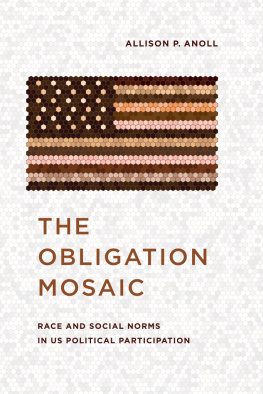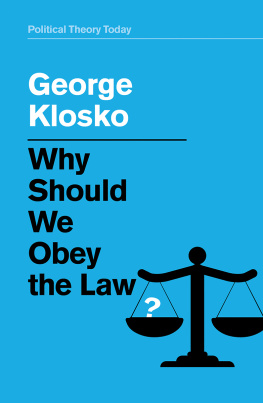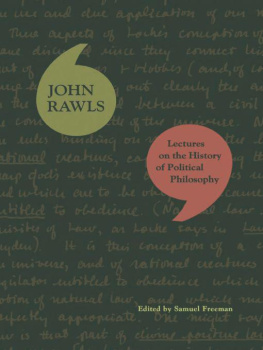ON POLITICAL OBLIGATION
JUDITH N. SHKLAR
EDITED AND WITH AN INTRODUCTION BY SAMANTHA ASHENDEN AND ANDREAS HESS
On Political Obligation

Published with assistance from the foundation established in memory of Amasa Stone Mather of the Class of 1907, Yale College.
Copyright 2019 by the Estate of Judith N. Shklar.
All rights reserved.
This book may not be reproduced, in whole or in part, including illustrations, in any form (beyond that copying permitted by Sections 107 and 108 of the U.S. Copyright Law and except by reviewers for the public press), without written permission from the publishers.
Yale University Press books may be purchased in quantity for educational, business, or promotional use. For information, please e-mail (U.K. office).
Set in Scala type by Integrated Publishing Solutions.
Printed in the United States of America.
Library of Congress Control Number: 2018948869
ISBN 978-0-300-21499-4 (hardcover : alk. paper)
A catalogue record for this book is available from the British Library.
This paper meets the requirements of ANSI/NISO Z39.48-1992
(Permanence of Paper).
10 9 8 7 6 5 4 3 2 1
CONTENTS
ACKNOWLEDGMENTS
THE EDITORS WOULD LIKE TO THANK the Pursey Library staff at the Harvard Archives for their careful assistance, and the estate of Judith Shklar for permission to publish this work. We would like to thank Birkbeck College (S. Ashenden) and University College Dublin (A. Hess) for making available funds for travel and research. We also thank Joseph Reisert and Richard Katskee, two of Shklars former teaching fellows, for supplying us with additional lecture and course material. Two anonymous reviewers read our proposal at the outset and provided us with encouragement and insightful suggestions. We were helped in our efforts by the editorial staff of Yale University Press, and in particular by Jaya Aninda Chatterjee and Susan Laity. We thank Susan Laity especially for her meticulous editing. For secretarial and technical support we are indebted to Jennifer Sullivan (University College Dublin), Simon Abbott, and Imran Islam (Birkbeck College).
INTRODUCTION: JUDITH N. SHKLARS LECTURES ON POLITICAL OBLIGATION
Samantha Ashenden and Andreas Hess
Why should we obey or disobey the government? Most people ask these questions when they are faced with incompatible loyalties, but some raise them when law and private conscience are in conflict.
Can individual liberty ever be consistent with political obligation?
Judith N. Shklar, Political Obligation
The Lectures and Their Context
Questions of political obligation are at the heart of political theory. They deal with power, authority, right, collective decisions, rule over oneself and others. When is one bound by collective decisions? On what basis rests this obligation? What are its limits? Looking at the grounds given for political obligation by any political theorist provides a key to the core of his or her argument. This is perhaps one of the main reasons why Judith Shklar chose to frame her course on moral reasoning chiefly as a course on political obligation. It offered a prospect from which to look at the kernel of some of the most significant and enduring problems of politics, and it provided the opportunity to investigate these problems in an open-textured and comparative manner.
This book contains Judith Shklars Harvard lectures on political obligation, delivered in the spring of 1992, just before her untimely death in September of that year. In the universitys 19911992 Courses of Instruction, Political Obligation was listed as a core course within a broader Moral Reasoning program, aimed mainly at undergraduate humanities and social science students. Apart from their Socratic teaching style, which shows a gifted teacher thinking on her feet, what is so remarkable about these lectures and what distinguishes them from Shklars previous courses is the insight they provide into her own mature intellectual endeavor. However, in order fully to appreciate this late turn and how the lectures on political obligation fit into it, we have to understand how Shklar saw her own role as a teacher and what she had to say about the relationship of teaching to research and writing. Such an understanding necessarily reveals also some of Shklars reservations regarding the publication of lectures.
For Shklar, political theory was the elucidation of common experience (Legalism, 28). Teaching political theory involved a number of requirements, one of which was to show love and passion for the subject; another was to aim not to bore students with classic texts but use those texts to help students discover the intellectual surplus that can be gained from studying them: For the teacher there has to be an enduring intellectual incentive, for the student, something more genuine than mild entertainment. To teach this literature as if it were a precious gift that one gives to every new generation of students, one must really want to read it over and over oneself, because each reading reveals new possibilities, new perceptions, and new ideas (Why Teach Political Theory? Quotations from Shklars lectures are taken from the texts in this volume). Against turning the classics into a repetitive exercise and therefore into a banality, Shklar stressed that it was crucial to encounter, in an intense way, the intellectually wholly other, and to discover how superior to the present and the familiar the utterly remote can be. To that end it was important to convey to students the conviction that a complete person must be able to think intelligently about government, and that the only way to rise above banality is to learn to think ones way through the works of the great writers on the subject and to learn to argue with them. To see how political ideas fit into the republic of letters generally, into the political systems within which they took place, and finally to see what is dead and alive within this accumulated wealth of psychological and social speculation is to be intellectually transformed, and to have something completely and immediately relevant to think about at any time of the day.
As to prioritizing so-called research and ones own work over teaching, Shklar maintained that such a distinction was anomalous: Teaching students is as much ones own work as anything can be, and research is something that natural scientists do. Very little if anything that a political theorist does can be described as an addition to factual knowledge about the world, as experimentation or as discovery. It is therefore pretentious and silly for us to talk about a conflict between the demands of research and teaching (ibid.). Shklar finds it rather more helpful to distinguish between two types of teaching, that which is directed face to face, and that pursued indirectly through writing. She comments that both are psychologically necessary for a full scholarly life because they make different demands upon the teacher. To address an indeterminate and anonymous audience of readers is very different from talking to visible students.... Still one is teaching political theory, because in one way or another, one writes to instruct ones readers. The greatest difference in writing rather than talking is that one can concentrate entirely on getting it right. Writing becomes then in the end an act of self-clarification and self-education, independent of whether it be a matter of placing texts in historical context, a conceptual analysis, an explication of a text, or an argument about a set of ancient issues in the light of current experience. Shklar concludes: The issue thus cannot be whether to teach or to write, but how to engage in two ways of teaching simultaneously or alternatively.
Next page












